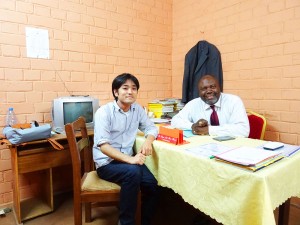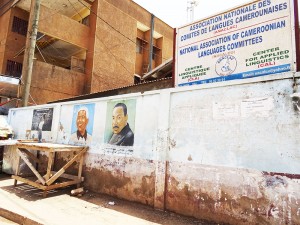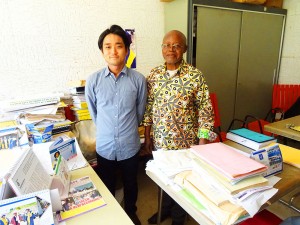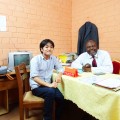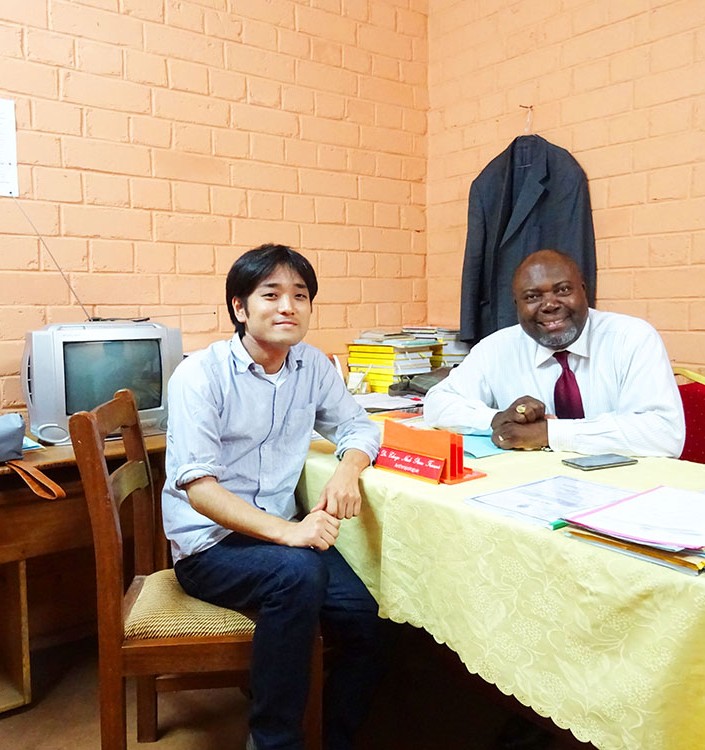
Strategic Young Researcher Overseas Visits Program for Accelerating
Brain Circulation
―Network Formation for Reconstructing the Paradigm of African Area Studies in a Globalizing World―
Cameroon Report
Preliminary study for a new collaborative research
Key Words:Language Socialization, Applied Linguistics, Diversity, Cameroon, Research Environment
Koji Sonoda
9 June 2016 – 2 December 2016
Faculty of Arts, Letters and Human Sciences, University of Yaounde I (the Republic of Cameroon)
- Research Project
I conducted research on language socialization among Baka hunter-gatherers in eastern Cameroon. The easygoing nature of the relationship between children and adults has been studied. The aim of my project is to show how this relationship is closely related with the tropical rainforest environment in which they live with respect to their perspective of everyday life. Using this topic as a springboard for discussion, I exchanged ideas with researchers in Cameroon to reveal the theoretical basis on which these researchers and I relied. In particular, we discussed how we could develop our collaborative research aiming for the international symposium scheduled to be held in 2017.
- Details of My Stay
The purpose of my stay in Cameroon was to collect information on Cameroonian researchers and to carry out my fieldwork. I spent a considerable amount of time on the former project. We exchanged opinions on my project and I collected their works from several institutions, including the Faculty of Arts, Letters and Human Sciences of the University of Yaounde I (Photo 1).
Language socialization is a subordinate field of linguistic anthropology wherein one views the process of socialization based on the actual usage of language in a community. This is an inter-disciplinary approach and, therefore, I needed to contact researchers from a broad range of fields, such as cultural anthropology, educational anthropology, sociolinguistics, and applied linguistics. Therefore, I stayed at some associations that were organized by researchers in not only the department of anthropology, but also other departments of the University of Yaounde I. This activity also formed a part of my project. For example, ANACLAC (Association Nationale des Comités de Langues Camerounaises) or NACALCO (National Association of Cameroonian Language Committees) is an organization established by sociolinguists and applied linguists in the University of Yaounde I in 1998. They endeavor to preserve and promote the local national languages of Cameroon (Photo. 2). I conducted an interview with Etienne Sadembouo. Besides being a representative of this association, he is a professor of the department of African Languages and Linguistics. We talked about the social significance of linguistics and the trends in recent studies of this domain in Cameroon (Photo 3).
- Impressive Experiences
During my stay in Cameroon, I continued to ask myself how I could add significance to the symposium in order to accelerate the collaboration of researchers between Cameroon and Japan. I put myself in the researchers’ environment of this country. This provided a rare opportunity for me to think about our practical collaboration.
What I was most interested in was the situation in Cameroon where people with diverse cultures, languages, and values live together. This situation can be found in other African countries, but Cameroon is distinctive with respect to the fact that it has more than 250 languages and all of these languages are adopted as the “national languages.” Moreover, the interaction among the people and the national integration remains a major preoccupation for Cameroonian researchers themselves. Even they do not have any definite answers on it. It may be a long-term issue for me as well. Plurality and diversity in Cameroon have been argued in a variety of settings, such as religion, region, community, politics, and education. I realized that the plurality and diversity were a common idea when I studied the socialization of Baka children. This experience will have a significant impact on expanding our symposium and our collaboration.
- Achievement and Reflection
As mentioned above, through my acquaintance with a variety of researchers and exchanging ideas with them, I was able to achieve my goal of having substantial discussions about our symposium. It was significant that I could know many Cameroonian researchers who showed interest in the diversity of their own country and tried to capture its potential.
However, there is a point on which I should reflect. Cameroon adopted a bilingual policy to use English and French. Although the University of Yaounde I also adopted this policy, Francophone is an overwhelming majority. For that reason, I made several efforts to argue with them in French. For instance, I gathered a number of their articles and books written in French, and continued to add vocabularies of French during discussions. Nevertheless, I could not debate with them on an equal footing in terms of language fluency. I continue to apply myself to improve my French skills.
- Future Work
The research environment at the University of Yaounde I is different from that of Kyoto University with respect to the access to literature and researchers abroad. Cameroonian researchers also appealed to me the inadequacy of their resources in other institutions. Based on this experience, I hope to build a long lasting relationship with them. Through visiting the field sites, holding a workshop in university in Cameroon, and submitting papers to journals in this country, I hope to share the result of our joint research in the future.
Photo 1. Dr. Pierre François Edongo Ntede, Department of anthropology.
Photo 2. ANACLAC / NACALCO.
Photo 3. Pro. Etienne Sadembouo, Department of African Languages and Linguistics.

